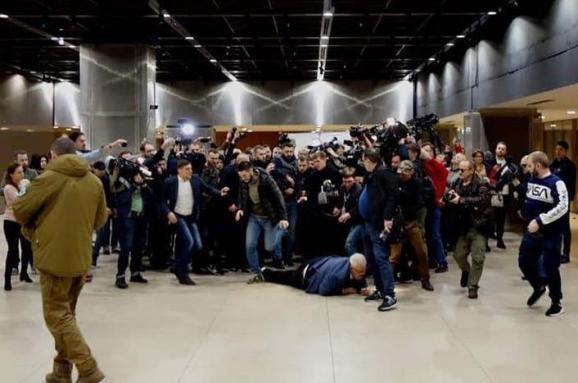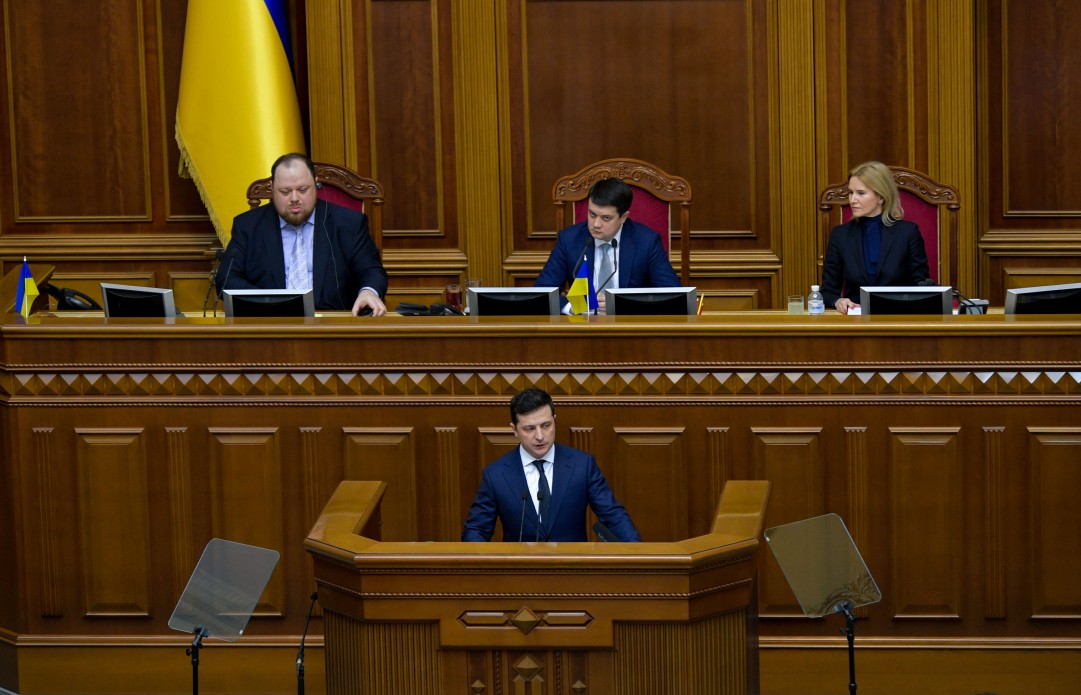Previous article: Critics of Ukrainian President Zelenskyy face criminal charges
“If we’ve chosen democracy, of course we can’t hang people. Although! Sometimes you really want to. And do you know why? Because it would be quicker. Much quicker.”
“We are joking,” said his press secretary, looking disconcerted.
But every joke contains a kernel of truth. Previous articles have been written about criminal cases being launched against bloggers and volunteers for criticizing the president. Now, persecution continues with new rigor, as Member of Parliament Sofiya Fedyna, European Solidarity party, faces unwarranted reprisals and is banned from leaving Kyiv.
Nor is she alone. More cases have been opened, with apartment searches of those who have criticized presidential or his officials' policies. Even a defense attorney has been subjected to a search by authorities.
The alarming case of MP Sofiya Fedyna
MP Sofiya Fedyna faces criminal charges along with military volunteer Marusia Zvirobiy, for a video where they ostensibly criticize Zelenskyy. Prosecutors claim they threatened the president with death.
In the video, Fedyna indeed blasted Zelenskyy for many reasons, including his controversial decision to disengage Ukrainian troops at the frontline with the so-called Luhansk and Donetsk “People’s Republics” in eastern Ukraine. His decision was regarded as ill-conceived because it would make Ukrainian troops more vulnerable in the face of the Russian adversary, who clearly has no intention of making peace.
Fedyna countered, saying that she did not threaten the president and obviously had no intention of seeing him killed. In point of fact, her intention was to underscore that the president could only understand the risk to soldiers, through his own eyes. Only then would he be able to make relevant decisions:
“It seems ‘Comrade President’ thinks he is immortal. They [Ukrainian soldiers] are protecting Ukraine every day from the enemy you [Zelenskyy] are trying to bring back here with your presidency. A grenade may accidentally explode there [at any time]. You know, shelling happens by accident. But frankly, it would be nice if all of this happened during the Moscow shelling, when someone in his blue shirt would appear on the frontline again.”
On 10 March, preliminary penal measures were taken against Fedyna. She was banned from leaving Kyiv and obliged to wear an electronic wristband. She may be facing five years of imprisonment -- all because of a video posted on Facebook.
There is no other word for such extreme measures than draconian. Fedyna lives in Lviv because she is the sole caretaker for her disabled father. She limits her time in Kyiv to only attending parliamentary sessions. The ruling to curtail her freedom of movement will leave her father abandoned.
No doubt, such a harsh decision was meant to publicly wield the power of the authorities, but it only had the effect of revealing their weakness, in the opinion of MP Mykola Kniazhytskyi.

Another European Solidarity MP, Oleksiy Honcharenko, is known for his tough criticism of Zelenskyy’s policies, in particular the president’s excessive measures against Fedyna and his attempts to undermine former President Petro Poroshenko.
Honcharenko has admonished Zelenskyy several times in Parliament. After his latest declaration, members of Zelenskyy’s party warned Honcharenko that he was “playing with fire” and should be careful in his comments.
Honcharenko’s response quoted the famous words about those who ignored the threat of the Holocaust:
“‘When they came for Jews, I was silent because I was not a Jew. When they came for the opposition, I was silent because I was not an oppositionist. When they came for me, there was no one left who could help me.’ Everyone who is silent now about the political persecution of Sofiya Fedyna and Petro Poroshenko, you should know that they will come for you too.”
Fedyna became the first MP to face harsh measures. Her comments after the court hearing were compelling:
“Here in Ukraine, we have political persecution. I, Sofia Fedyna, Member of the Ukrainian Parliament, am being prosecuted by the prosecutor general and by the President of Ukraine, not only because of saying that bombs are exploding on the frontline, which is the real truth of what is going on, but because this President of Ukraine has perceived these words as a personal threat to him, and he wishes to sentence me to five years of imprisonment ... This also applies to the Ukrainian Cyber Alliance, the volunteers who are being prosecuted only for criticizing the president ... As a member of the Ukrainian Parliament, as a civil servant, and as a citizen of Ukraine, I am obliged to speak out about the problems ... I appeal to international institutions -- to the whole civilized world -- to recognize the political persecutions in Ukraine, which is no longer becoming a democratic country.”
The slow but gradual expansion of presidential power becomes yet more evident with the appointment of Iryna Venediktova as the new prosecutor general. She has implied
that everything that can be done quickly to prosecute former President Poroshenko will be done. Experts and civil society fear that Venediktova will implement any goals set by the Presidential Office.
Read also: Parliament’s urgent quarantine agenda. MPs appoint new prosecutor general
Apartment search of Sheremet murder case attorney
Three years ago, Pavlo Sheremet, Belarusian-Ukrainian journalist was killed in central Kyiv. In November 2019, police detained suspects that shocked Ukraine: Andriy Antonenko, a rock musician, composer and sergeant of the Ukrainian army’s Special Operations Forces; Yuliya Kuzmenko, a pediatric cardiac surgeon; and Yana Duhar, a medical sergeant in the 25th Airborne Brigade.
Since then, five months of investigations and court hearings have been conducted. Yet, police evidence remains inconclusive, riddled with discrepancies and absurd claims. Civil society holds protests during each court hearing to support detained military volunteers. Despite a lack of evidence, suspects have been detained for as many as five months. On 12 March, these initial prosecutorial measures were extended.
Read also:
- Official version in journalist Sheremet murder defies common sense
- Police evidence in murdered journalist Sheremet’s case looking shaky
One recent — even more disturbing -- detail in this case is the pressure exerted on Antonenko’s defense attorney Denys Maslov. Maslov is known for his denunciation of all court proceedings against volunteers for being political and groundless. To intimidate him, searches have also been conducted in his apartment.
Investigators argued that the search was necessary because Maslov had access to Antonenko’s social media profiles. However, such searches represent a gross violation of attorney-client privilege, which is guaranteed by law. Moreover, these measures constitute further illegal intimidation that brings under suspicion the entire Sheremet case and its likely political motivations.
Police raid on Ukrainian Cyber Alliance
Previously, the Ukrainian Cyber Alliance (UCA) played a crucial role for the government by battling Russian cyberspace aggression. It is the UCA that hacked the Surkov emails which provided a rich source of information on Russian tactics, including strategies for hybrid war and the manner of cyber attack.
However, on 25 February, police conducted raids against UCA members as well as its founders -- Shon Townsend, Oleksandr Galushchenko, and Andriy Pereveziy. They have since been charged with cyber terrorism for a prank in the Odesa airport, where they allegedly posted an image of climate activist Greta Thunberg with profanities. Why these allegations have been brought specifically against the UCA is unclear, and remains unexplained by the Security Service of Ukraine. Moreover, searches in the apartments were carried out with multiple violations, harming devices and destroying personal notations.
Read also: Hacktivists of #SurkovLeaks stop helping Ukrainian government after police raid
Taunsend commented
on the searches saying they were pressure tactics -- revenge for participating in political rallies:
“...The Security Service of Ukraine inspected the page, and came to the conclusion that a number of posts had disrespectful reviews, and in some places ‘threats' to ‘the greatest leader of our time,’ as well as calls to join rallies ‘directed against the president.’ For you to understand, we are talking about rallies on the Day of the Defender of Ukraine, in which democratic Ax [political party] took part. Evidently, our Security Service is not engaged in national security, but … protects Zelenskyy’s business reputation. If the Day of the Defender of Ukraine is seen as a threat for the Security Services of Ukraine then I just do not know what else can be added.”
After these raids against hacktivists, the UCA stopped supporting the Ukrainian government and demanded official apologies.
The ambiguous Syvokho case
Serhiy Syvokho is known as an anti-Maidan proponent who supported the runaway President Viktor Yanukovych in 2014. Oddly, in October 2019, Syvokho was appointed as an advisor to the Secretary of the National Security and Defence Council. He is now actively promoting Putin's narrative of reconciliation which, in reality, translates into special status for the now-occupied regions in Donbas. Seemingly, he also supports the official recognition of the Russian language and culture as organic to the Ukrainian state — thus supporting another false basis for seceding territories of Ukraine to Russia.
Particularly reprehensible were Syvokho’s statements about the war in Donbas, describing it as an internal Ukrainian conflict -- words straight out of Putin’s playbook. When journalists probed his stance, Syvokho danced around their questioning and avoided naming Russia as the aggressor.

On 12 March, in Kyiv, Sybokho presented to journalists his proposed policy for peace, titled “National platform for reconciliation and unity.” The event was disrupted by Ukrainian war veterans -- now members of the National Corps political party. They protested the principles laid out in the presentation and asked Syvokho to leave the hall. After requesting his exit repeatedly, they physically removed him.
The police subsequently charged six people for hooliganism and violent interruption of the public event. They now face up to four years of imprisonment. Oleksandr Demydov, one of the members of the National Corps, has already been confined to house arrest. Although it is obviously illegal to forcibly eject an individual from a public setting, defense lawyers are objecting to the severity of charges.
Ultimately, the most important conclusion arising from the actions of the authorities is the double standards and indisputable political connotation. In effect, police should have detained Syvokho and questioned his apparent ties to Russians who promote the capitulation of Ukraine. Ukrainian law clearly defines Russia as the aggressor-state. To reject this by a public official is a treason of state interest and bears responsibility. It is Syvokho who should have been detained, or at the very least dismissed from office, with official apologies issued to the members of the corps.

In these circumstances, how could Ukrainian veterans have ignored Syvokho’s affront to the very essence of Ukrainian independence? They may be regarded as being guilty from the legal point of view, but it is a whole other question as to why the state prosecutors and police did not detain Syvokho. Such double standards of authorities are raising the question of who exactly are they working for. Instead of reaching for peace and safety, Syvokho’s statements provoke Ukrainian veterans to mistrust their own authorities.
Read also:
- Ukraine’s president Zelenskyy turns blind eye to Putin-Medvedchuk scheming
- Ukraine’s government has ventured into dangerous waters, but it’s not too late to set the boat on course – Marynovych
- Experts question future of Ukrainian judiciary as court cancels judicial reform
- Parliament’s urgent quarantine agenda: MPs appoint new Prosecutor General
- Quarantine parliament: Ukrainians rally against using coronavirus situation to rush treasonous laws
- Shady agreements legitimizing Russia’s puppet “republics” likely signed in Minsk

